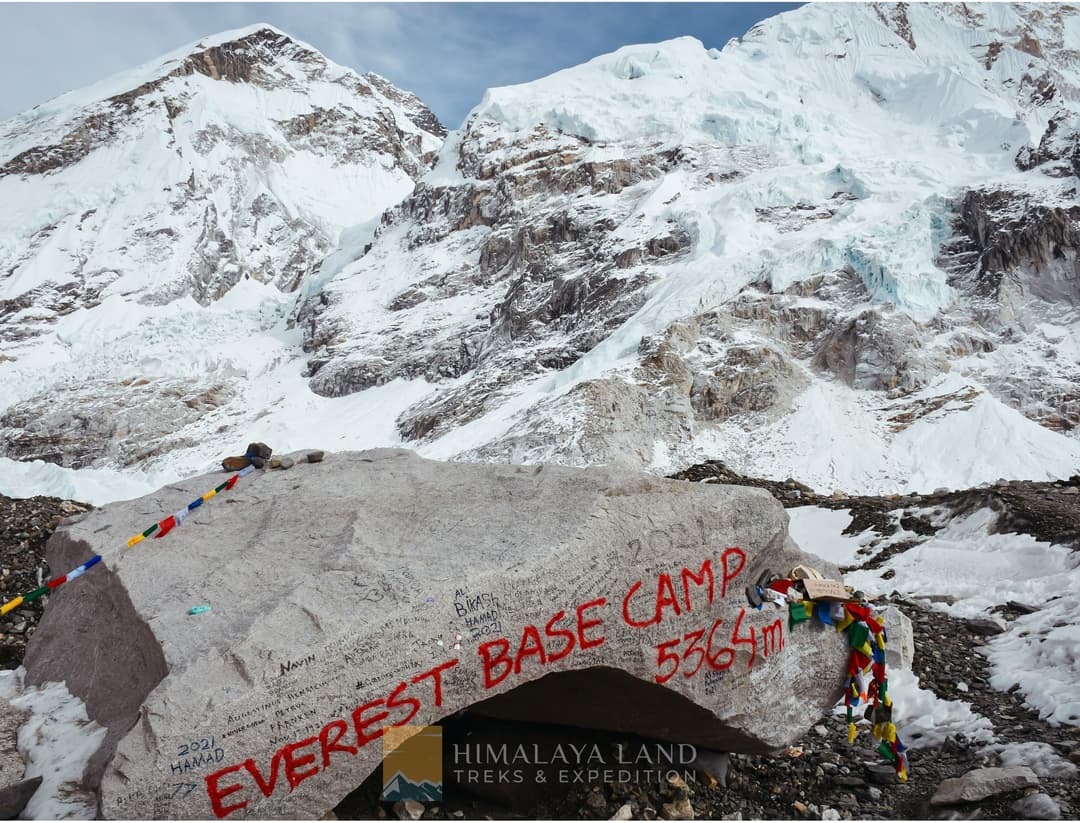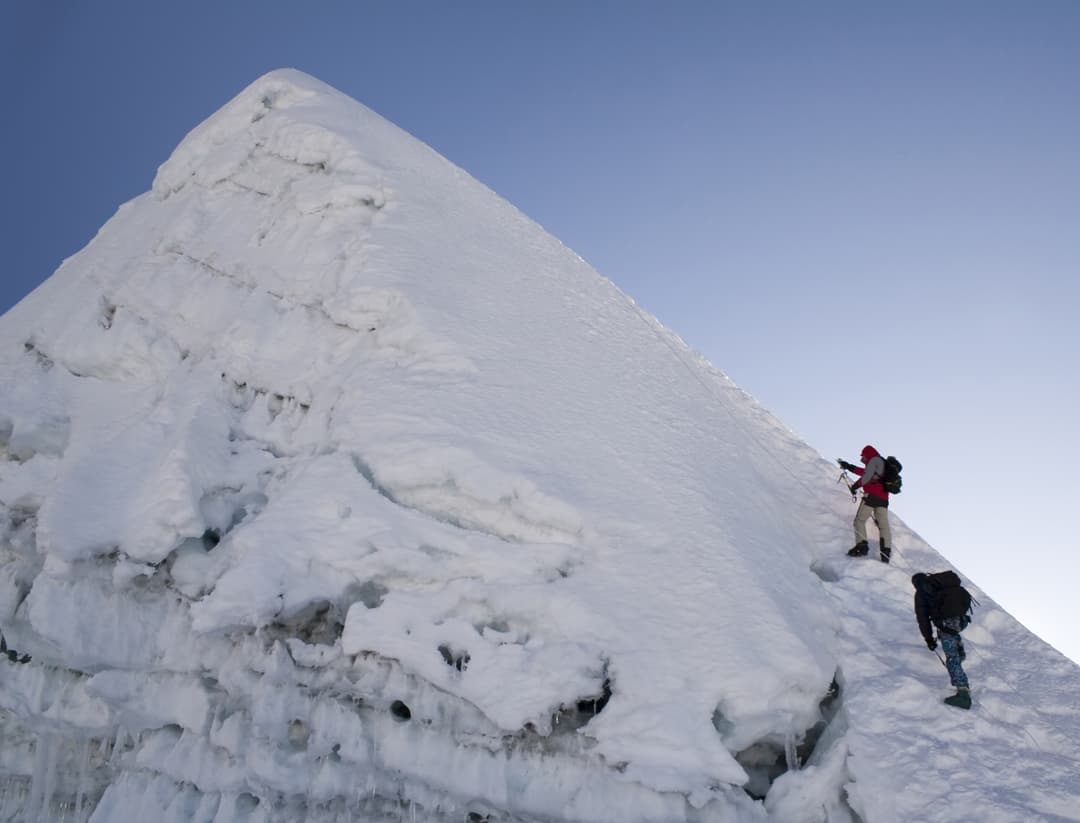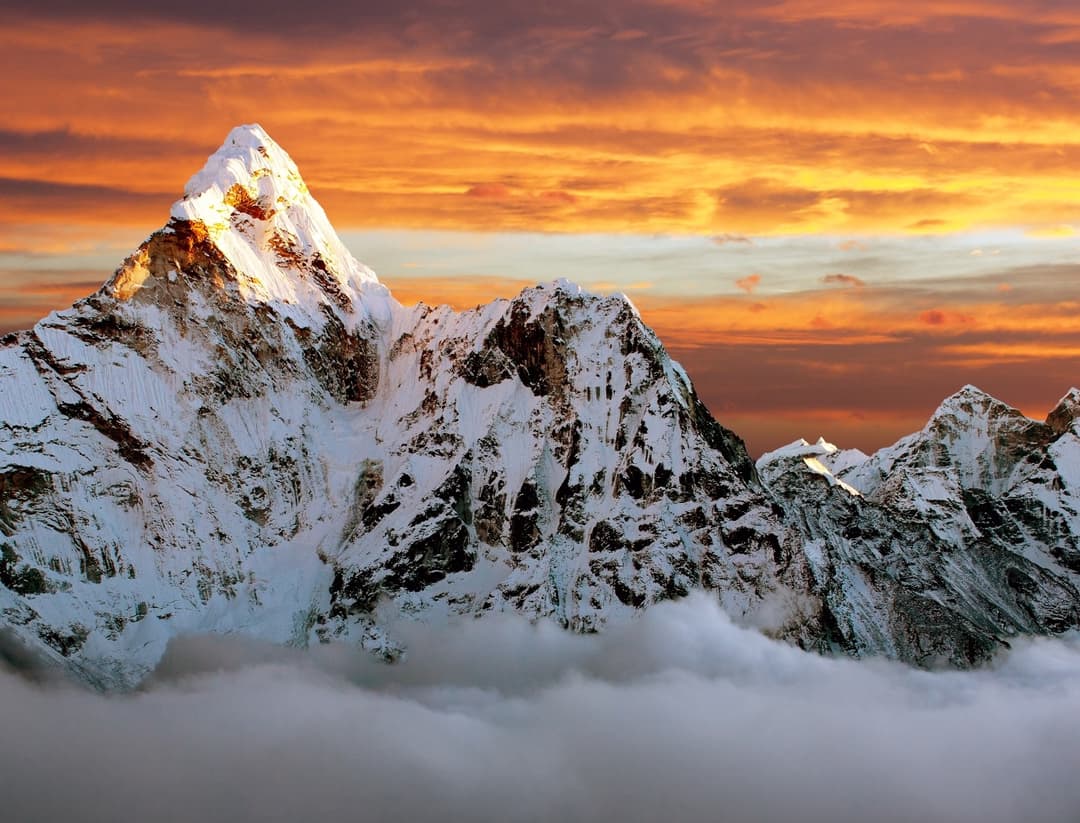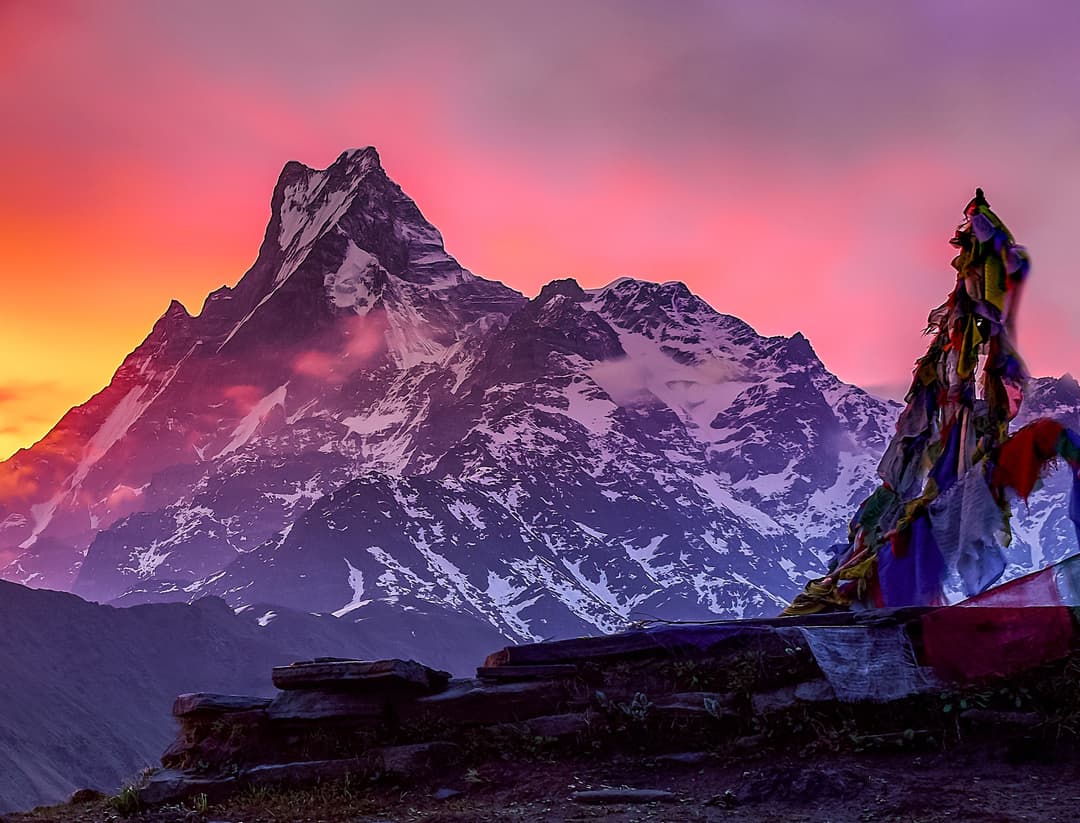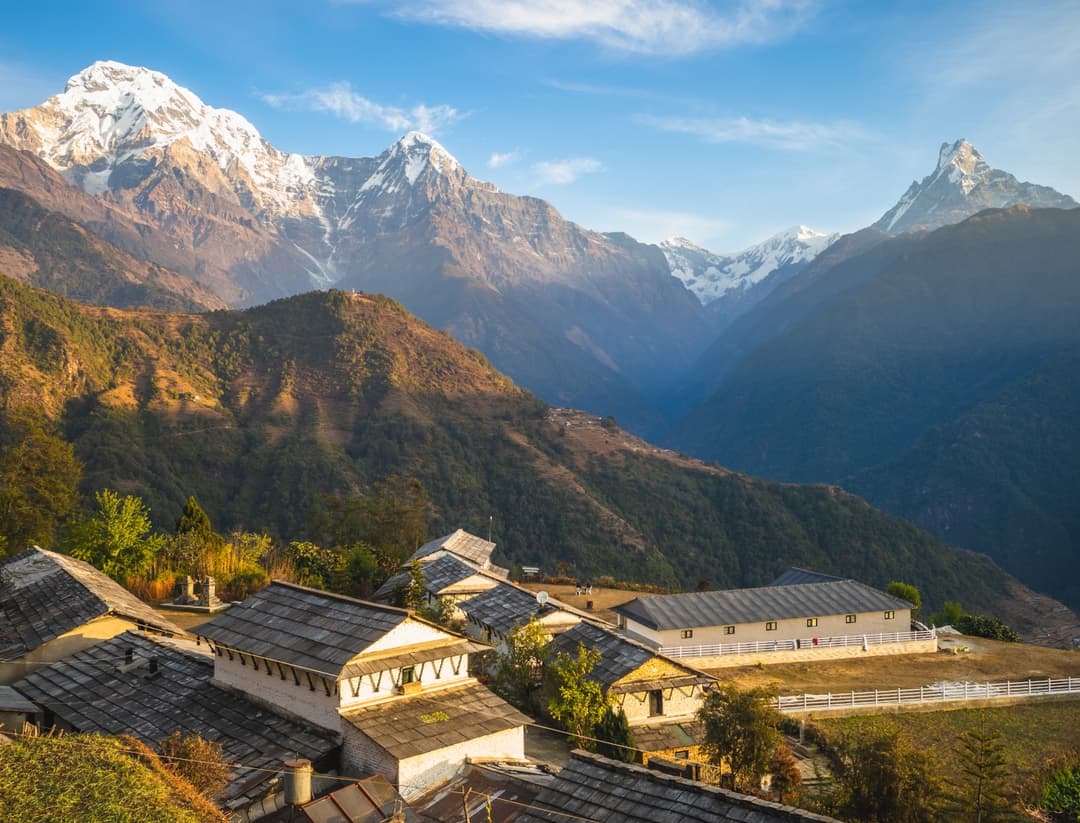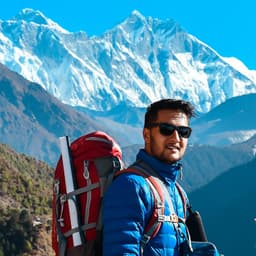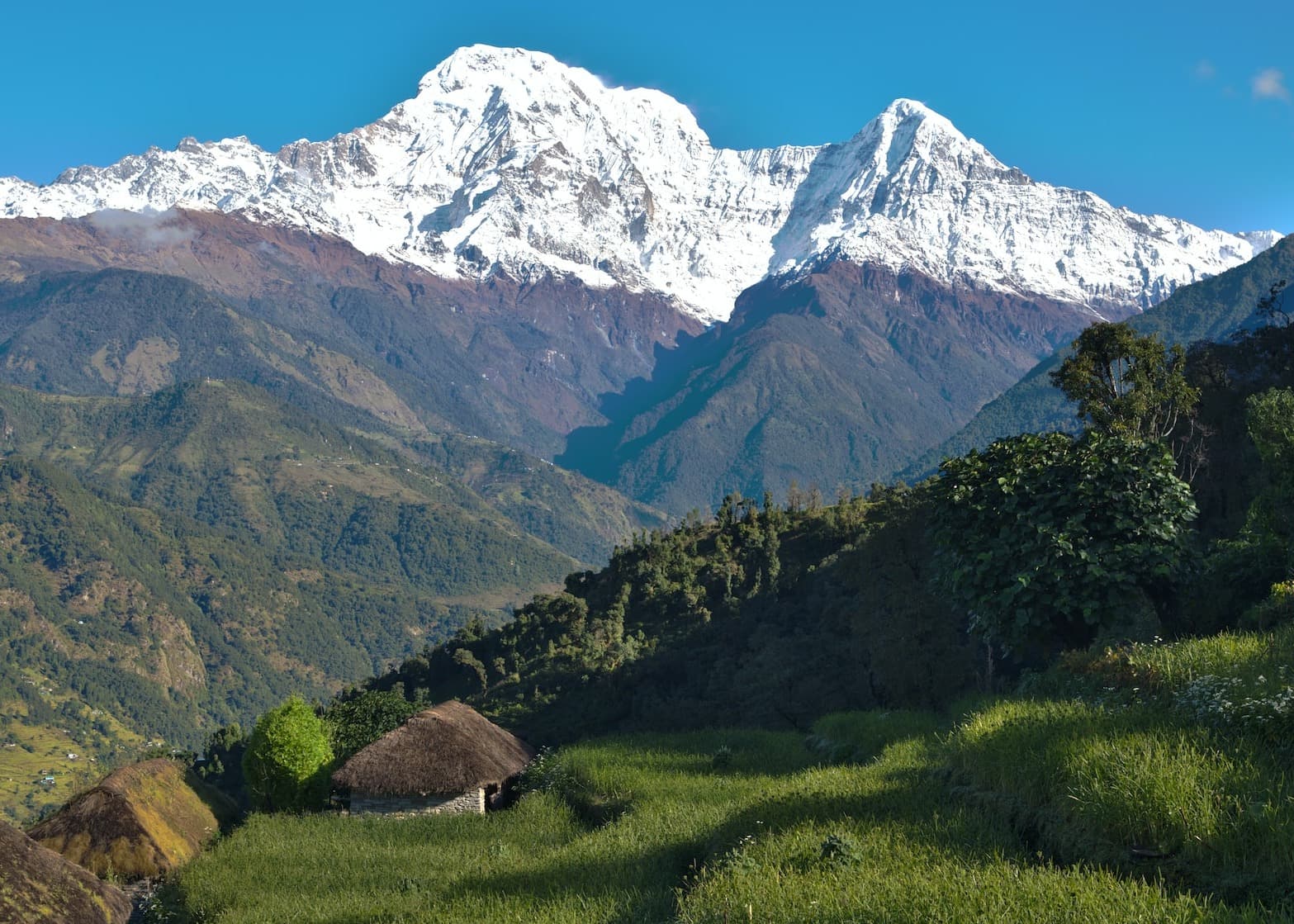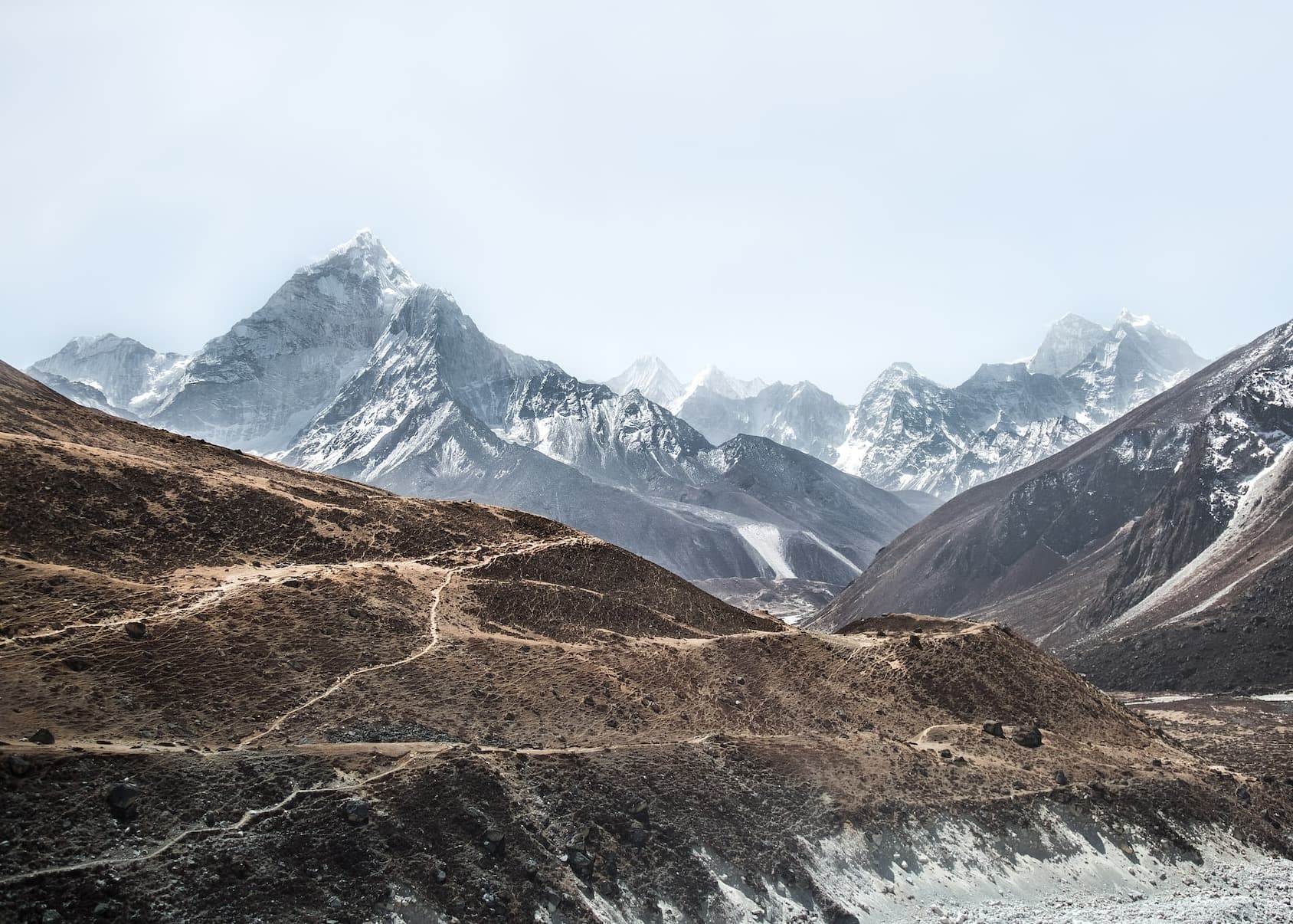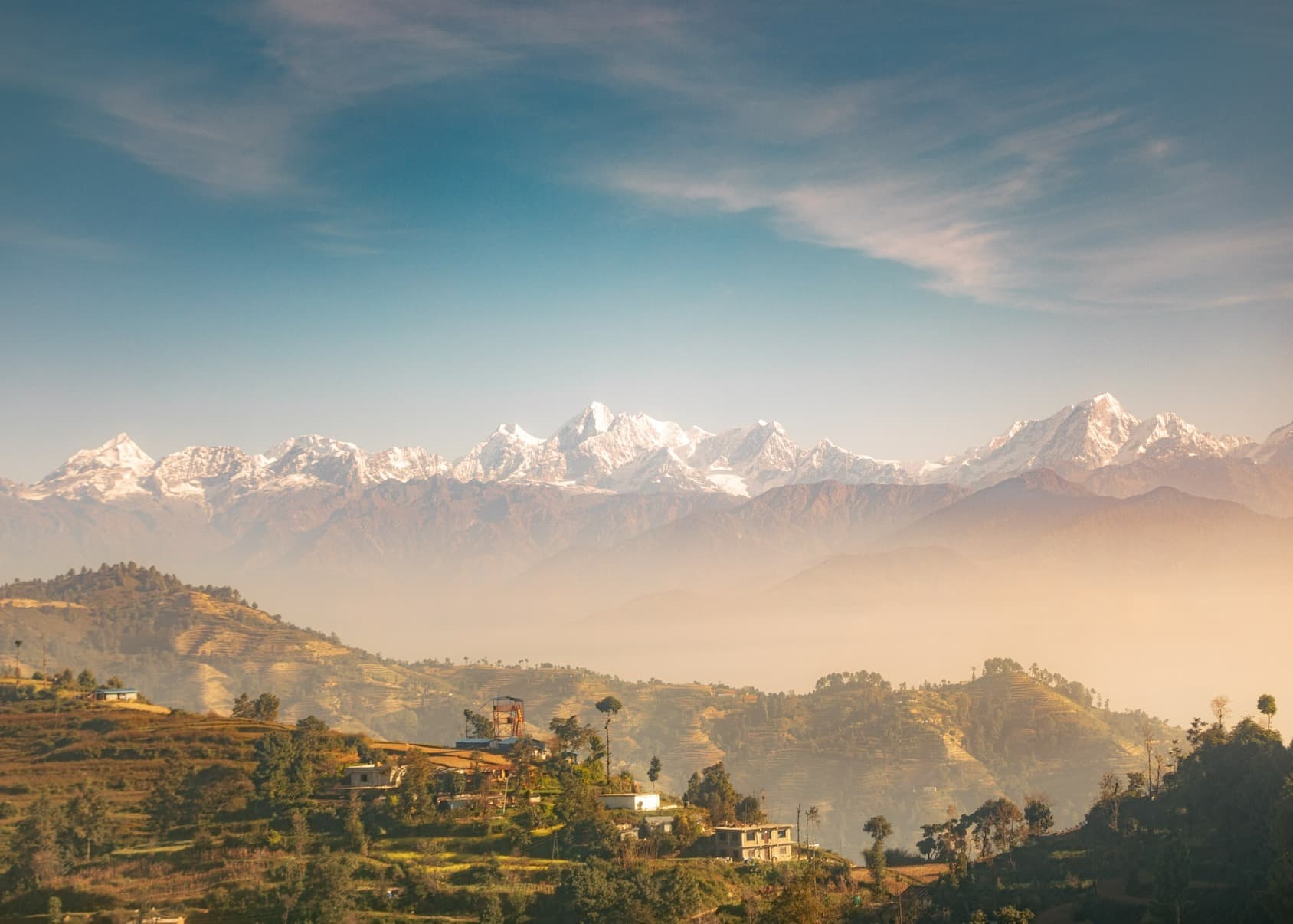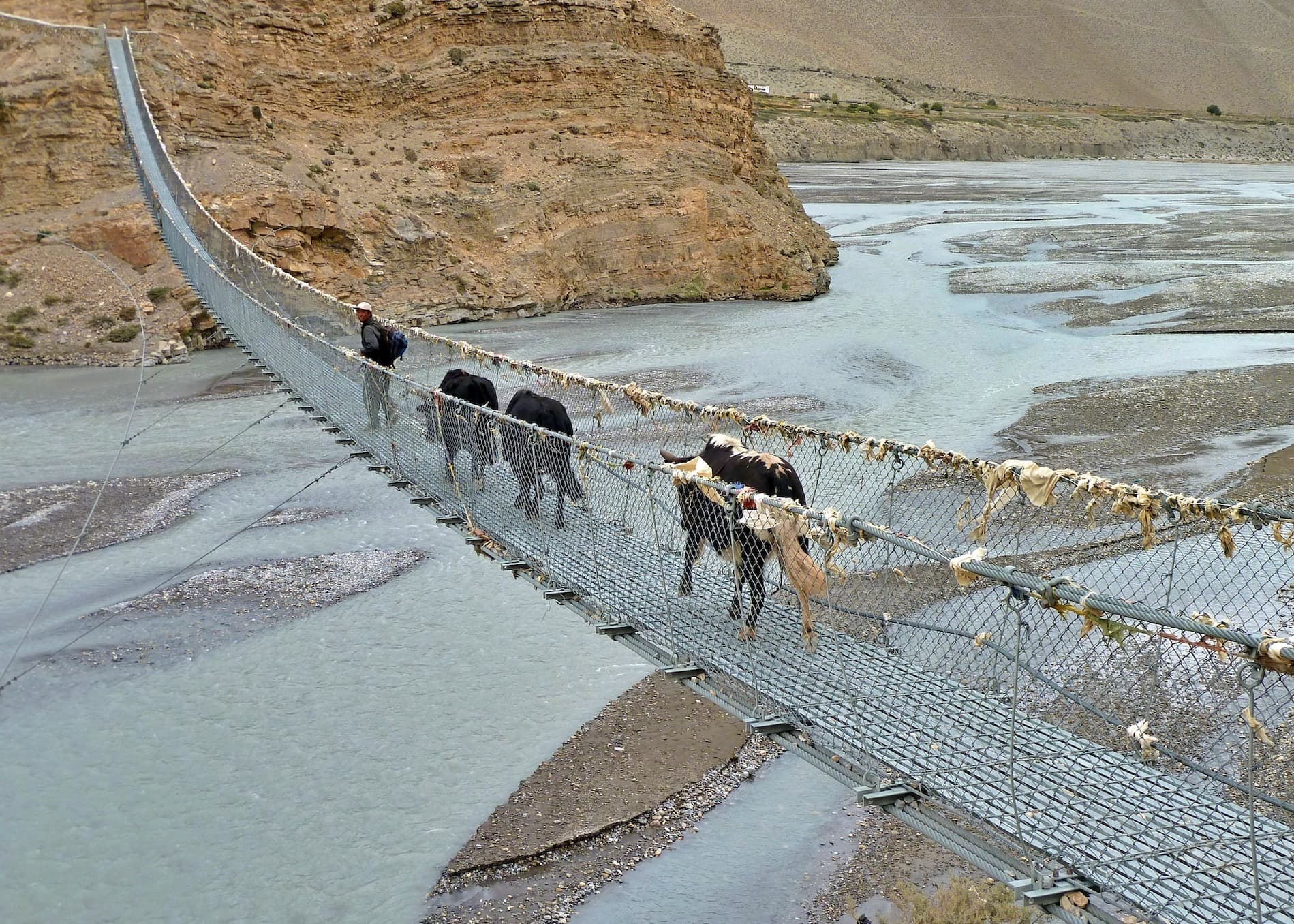Embarking on an adventurous journey through the mesmerizing Himalayas and reaching the summit of the world is a once-in-a-lifetime experience that should not be missed. The Everest Base Camp trek, located at an altitude of 5,364 meters in the stunning Khumbu region, offers a breathtaking panoramic view of the Himalayan range, including the majestic peaks of Ama Dablam (6,812m), Cho Oyu (8,201m), Nuptse (7,861m), Lhotse (8,516m), and the grand Mt. Everest (8,848.86m).
The journey to this magnificent destination begins with a scenic flight to Lukla, followed by a trek through the lush green forests of pine, juniper, and rhododendron in the Sagarmatha National Park. The trail then takes you to explore the unique lifestyle of the native human settlement at the world's highest altitude, 'Namche Bazaar.' This trek also provides you with a first-hand experience of the distinctive Sherpa culture. Visiting ethnic Himalayan hamlets and ancient monasteries are major attractions of this trek.
To prepare for the Everest Base Camp trek, it is essential to be physically fit, mentally prepared, and well-equipped with the necessary gear. The trek requires stamina and perseverance to cross rocky, snowy trails and challenging terrain. Therefore, it is advisable to undergo training beforehand to enhance your physical fitness level.
Apart from the scenic beauty and adventure, the trek offers an opportunity to immerse yourself in the unique Sherpa culture, interact with locals, and learn about their daily lifestyle. It is a chance to discover the history and culture of the Himalayan region, including ancient monasteries and local villages.
The Everest Base Camp trek is an unforgettable adventure that offers a perfect blend of beauty, adventure, and cultural experience. It is an opportunity to explore the world's highest peaks and to create lifelong memories while also improving your overall health and well-being. So, pack your bags, prepare yourself mentally and physically, and get ready for an experience of a lifetime!
Embarking on a trek to the base camp of the world's highest mountain, Mt. Everest, is a thrilling adventure that requires meticulous preparation. In this blog, we will provide you with detailed information on the necessary preparation you need to make before embarking on this challenging journey.
Firstly, you need to familiarize yourself with the route that needs to be followed. The route to Everest Base Camp starts with a scenic flight to Lukla, followed by a trek through the Sagarmatha National Park's lush green forests of pine, juniper, and rhododendron. The trek then takes you to Namche Bazaar, the world's highest altitude human settlement, where you can experience the unique Sherpa culture. From there, the trail leads to other stop points like Tengboche, Dingboche, Lobuche, and Gorak Shep, finally reaching the base camp of Mt. Everest.
The difficulty level of the route varies from moderate to strenuous, depending on the altitude and weather conditions. As you ascend to higher altitudes, the air's oxygen level decreases, making it difficult to breathe. Therefore, proper acclimatization is essential to avoid altitude sickness. It is advisable to take frequent breaks, drink plenty of fluids, and climb gradually to higher altitudes.
Food items available during the trek include local Nepalese cuisine and western-style dishes like pasta, pizza, and sandwiches. It is advisable to carry energy bars, nuts, and chocolates to keep your energy levels high during the trek. Additionally, it is crucial to stay hydrated and drink boiled or purified water to prevent water-borne illnesses.
Carrying proper equipment is crucial for a comfortable and safe trek. Some of the necessary equipment to carry includes trekking boots, warm clothes, sleeping bag, a down jacket, a waterproof jacket, gloves, a hat, sunglasses, and a backpack. It is also advisable to carry a first aid kit, water purification tablets, and a portable charger.
In conclusion, trekking to Everest Base Camp is an unforgettable adventure that requires meticulous preparation. Knowing the route, difficulty level, stop points, food items, and carrying the right equipment can make your journey comfortable and safe. So, prepare yourself well, get physically fit, and embark on this exhilarating journey to conquer the world's highest mountain!
- Everest Base Camp Trek: How to Prepare for the Route Difficulty
- Preparing for the Everest Base Camp Trek: Essential Equipment
- The Ultimate Guide to EBC Trek: How Long Does It Take?
- Everest Base Camp Trek Cost : Factors and Estimated Budget
- The Ultimate Everest Base Camp Trek Itinerary for 12 Days
- Discover the Beauty of EBC Trek with Himalaya Land Treks
Best Seller Treks
Everest Base Camp Trek: How to Prepare for the Route Difficulty
Embarking on the Everest Base Camp trek is a once-in-a-lifetime experience that requires careful planning and preparation. Among the most crucial factors to consider is the trek's route difficulty, which is considered moderately challenging.
Before starting the trek, you need to have a good level of physical fitness and mental preparedness. You will trek for 5-6 hours each day, covering hills and valleys, and as you ascend towards the base camp, the altitude increases. Altitude sickness is a common concern among trekkers, and it is crucial to take proper acclimatization measures to avoid it.
To prepare for the trek, start with building your endurance and stamina by engaging in regular cardio exercises like running, cycling, or swimming. You can also try hiking and trekking on less challenging trails to familiarize yourself with the gear and equipment.
Pack wisely by bringing essential gear like warm clothes, hiking boots, sunglasses, and sunscreen. A quality sleeping bag, waterproof backpack, and hydration system are also necessary.
Acclimatization is a vital aspect of the trek, and it involves spending extra days at specific heights to adjust to the altitude. Stay hydrated by drinking plenty of water and avoid smoking and drinking alcohol.
It is also advisable to consult with a doctor before starting the trek. They can provide recommendations for altitude sickness medication and check for any underlying health conditions that may hinder your trek.
In summary, proper preparation and acclimatization are essential for conquering the Everest Base Camp trek. With the right mindset, gear, and training, you can tackle the route difficulty and create unforgettable memories that will last a lifetime.
Tips for Physical Fitness and Mental Focus
Are you planning on taking on the challenge of trekking to the Everest Base Camp? If so, you need to make sure that you are physically and mentally prepared for the journey ahead. The trek to the base camp is a grueling one and requires strength, endurance, and mental focus. In this guide, we will provide you with tips on how to optimize your physical fitness and mental focus to ensure that you are ready to tackle the Himalayas.
Building Your Physical Fitness
To prepare yourself physically for the Everest Base Camp trek, it is crucial to start your training at least one month before the trip. You need to condition your body to handle the strenuous journey ahead. Here are some exercises that can help you achieve peak physical fitness:
Whole-body stretching exercises: Squats, lunges, step-ups, push-ups, sit-ups, and splits are all great exercises to help you build strength, flexibility, and endurance.
Aerobic exercises: Regular jogging and running will help you adjust your body's oxygen levels and increase your stamina.
Achieving Mental Focus
Mental focus is just as crucial as physical fitness when it comes to trekking in the Himalayas. Trekking at high altitudes requires mental endurance, focus, and determination. Here are some tips to help you achieve mental focus:
Meditation: Practicing meditation is an excellent way to maintain your focus and overcome any obstacles that may arise during the trek. You can try out guided meditation or simply find a quiet place to meditate and reflect on your journey ahead.
Positive Affirmations: Create positive affirmations that you can recite to yourself during the trek. These affirmations can help you stay motivated and focused when the going gets tough.
Ensuring Proper Nutrition and Hydration
Proper nutrition and hydration are essential for maintaining your physical fitness and mental focus during the trek. Make sure to carry high-energy snacks like nuts and dried fruit and stay hydrated by drinking plenty of water and electrolyte-rich drinks.
In conclusion, physical fitness and mental focus are crucial when it comes to conquering the Himalayas. By following these tips and preparing yourself both physically and mentally, you can ensure that you are ready to tackle the Everest Base Camp trek and any other trek you set your sights on.
Preparing for the Everest Base Camp Trek: Essential Equipment
Embarking on the Everest Base Camp trek requires proper equipment to ensure a comfortable and safe journey. In this blog post, we will discuss some essential equipment that you should consider carrying with you.
Trekking Boots: A good pair of trekking boots is essential for the trek, as you will be walking on rough terrain. Make sure the boots are waterproof and provide good ankle support.
Warm Clothes: As you ascend to higher altitudes, the temperature drops significantly. Therefore, carrying warm clothes like thermal innerwear, fleece jacket, woolen cap, and gloves is crucial to keep yourself warm.
Sleeping Bag: A good quality sleeping bag is a must-have item for the trek. It will keep you warm and comfortable during cold nights in the mountains.
Down Jacket: A down jacket is an essential item to carry as it provides warmth and protection from cold winds.
Waterproof Jacket: The weather in the mountains is unpredictable and can change quickly. Carrying a waterproof jacket will protect you from rain and snow.
Gloves and Hat: It is important to protect your extremities from cold weather. Carrying a warm hat and gloves is necessary to keep your head and hands warm.
Sunglasses: The sun's glare is more intense at higher altitudes. Carrying sunglasses will protect your eyes from the harsh glare.
Backpack: A good quality backpack with a rain cover is essential to carry all your gear and equipment.
First Aid Kit: A basic first aid kit with essential medicines, painkillers, and bandages is necessary in case of any injuries or sickness.
Water Purification Tablets: It is important to carry water purification tablets to purify water from natural sources before consumption.
In conclusion, carrying essential equipment is crucial for a comfortable and safe journey during the Everest Base Camp trek. Make sure to invest in good quality equipment and gear to ensure a smooth journey.
The Ultimate Guide to EBC Trek: How Long Does It Take?
The journey to Everest Base Camp is a dream adventure for many trekking enthusiasts. However, before embarking on this challenging trek, it is essential to know how much time it will take to reach the base camp.
Typically, the Everest Base Camp trek takes 12 days to complete, with 8 days to reach the base camp and 4 days to return. The trek duration is longer than other treks to help trekkers acclimatize to the changing altitude and temperature as they ascend higher into the mountains.
During the autumn and spring seasons, the temperature during the day is around 15-20 degrees Celsius, while it drops to 4 to -10 degrees Celsius at night. In the winter season, the daytime temperature drops to about -5 degrees Celsius and can plummet to -15 degrees Celsius or even less at night.
To ensure that trekkers are well-prepared for the sudden temperature changes and the high altitude, Everest trek packages are designed to allow trekkers to acclimatize at different stops. The 12-day trek offers enough time for trekkers to adjust to the extreme weather conditions, minimize the risk of altitude sickness and enjoy the trek to the fullest.
It is worth noting that the duration of the Everest Base Camp trek may vary depending on individual fitness level and pace. Some trekkers may opt for a longer trekking duration or shorter, depending on their preferences. However, it is recommended that trekkers do not rush to reach the base camp and take enough time to acclimatize for a safe and enjoyable experience.
In conclusion, the Everest Base Camp trek is an incredible journey that requires proper planning and preparation. Knowing how much time it takes to reach the base camp will help trekkers to plan their itinerary better, acclimatize to the changing weather conditions, and enjoy the trek without any discomfort.
Everest Base Camp Trek Cost : Factors and Estimated Budget
Embarking on an Everest Base Camp trek is an adventure of a lifetime. However, before you start packing your bags and head out, it's essential to consider the cost and budget accordingly. In this guide, we will discuss the various factors that affect the cost of the Everest Base Camp trek and provide an estimated budget to help you plan your trip.
Factors that Affect the Cost of Everest Base Camp Trek
Trekking Company: The trekking company you choose plays a crucial role in determining the overall cost of your trip. Different companies offer different packages with varying levels of services and amenities. The more comprehensive the package, the higher the cost will be. However, it's essential to choose a reputable company that prioritizes safety and provides excellent services to ensure a successful trek.
Accommodation Preferences: The cost of accommodation can vary depending on your preferences. Basic lodges are available at lower prices, while more luxurious options can be quite expensive. It's important to keep in mind that accommodations in the Everest region are basic and may not have all the amenities you are used to.
Food Requirements: The cost of food can vary depending on your dietary requirements. If you have any special dietary needs, such as gluten-free or vegan, it may cost more to cater to those needs.
Personal Expenses: Personal expenses such as souvenirs, drinks, and additional snacks can add up quickly. It's important to budget for these expenses beforehand to avoid any surprises.
Estimated Budget for Everest Base Camp Trek
On average, a 15-day trekking package organized by Himalaya Land Treks can cost around $1,550. However, this cost is only an estimate and may vary depending on the factors mentioned above. Here is a breakdown of the budget:
| For a single person | USD 1550 |
| For 2-4 persons | USD 1500 each |
| For 5-8 persons | USD 1440 each |
| For a group of more than 9 people | USD 1380 each person |
Final Thoughts
Embarking on an Everest Base Camp trek is an adventure that requires careful planning and budgeting. By considering the factors mentioned above and using the estimated budget as a guide, you can ensure that you are financially prepared for the trip. Remember, the cost of the trek is an investment in a once-in-a-lifetime experience that will create unforgettable memories that will last a lifetime.
The Ultimate Everest Base Camp Trek Itinerary for 12 Days
Trekking to Everest Base Camp is an experience of a lifetime. The trek is challenging but rewarding, with stunning mountain vistas, unique cultural experiences, and a sense of accomplishment that will last a lifetime. Here is a 12-day itinerary for the ultimate Everest Base Camp trek, optimized for maximum enjoyment and safety.
Day 1: Kathmandu to Lukla (2,800m/9,186ft) and trek to Phakding (2,652m/8,698ft)
Fly from Kathmandu to Lukla, a scenic 30-minute flight, and start trekking towards Phakding. The trek takes around 4 hours, passing through hills with moderate difficulty. Stay overnight at a guesthouse in Phakding with proper facilities for lodging and food.
Day 2: Phakding to Namche Bazaar (3,440m/11,286ft)
Trek from Phakding to Namche Bazaar, which takes around 6 hours. The trek starts in the Dudh Koshi River valley, through pine and cedar woodlands, before entering Sagarmatha National Park. From there, the trek continues into the emerald forests of the Himalayan woods towards the famous town of Namche Bazaar. The uphill journey offers amazing views of Kusum Khangkaru (6367m). Overnight stay at a guesthouse in Namche.
Day 3: Acclimatization Day in Namche Bazaar (3,440m/11,286ft)
This day is reserved for acclimatization. Adjust to the increase in altitude and prepare for higher altitudes with a one-day acclimatization in Namche. Visit the Sherpa Culture Museum and the Everest Photo Gallery in town. Hike to the Syangboche airstrip located above town and pay a visit to the Everest View Hotel, the highest located hotel in the world boasting views of Mount Everest (8848m). Overnight stay at a guesthouse in Namche.
Day 4: Namche Bazaar to Tengboche (3,860/12,664ft)
Trek in a beeline towards Tengboche, another famous village of the region. The trek takes around 5 hours, passing by ridgelines and suspension bridges over the Imja River. The Tengboche Monastery, one of the largest monasteries in the region, is a must-visit. Mesmerizing views of Ama Dablam (6856m) can also be enjoyed from here. Overnight stay at a guesthouse in Tengboche.
Day 5: Tengboche to Dingboche (4,410/14,469ft)
Walk along the Imja River towards the summer valley of Dingboche, a beautiful village situated in the Imja Valley. The trek takes around 6 hours with moderate difficulty. Overnight stay at a guesthouse in Dingboche.
Day 6: Acclimatization Day in Dingboche (4,410/14,469ft)
Acclimatize to the increased altitude with a day in Dingboche. Explore the village and enjoy the traditional ambiance with Mani stones carved with prayers, Chortens, and Prayer wheels lining the Stupas. Relax or hike up the vantage point of Nangkartshang (5616m) to enjoy panoramic views of the Imja Valley and the Everest ranges. Overnight stay at a guesthouse in Dingboche.
Day 7: Dingboche to Lobuche (4,910m/16,109ft)
Follow the trail winding alongside the Imja River towards Lobuche, a small settlement towered over by the Lobuche Peak. This is the last stop before reaching the base camp and the trail gets steeper and more challenging from here on.
Day 8: Lobuche to Gorak Shep (5,170m/16,961ft) and Everest Base Camp (5,364m/17,598ft)
Today you will trek to Gorak Shep, which is the final stop before reaching Everest Base Camp. The trail is rocky and rugged, with steep ascents and descents. After reaching Gorak Shep, you can either have lunch or head straight to the base camp. It will take around three hours to reach the base camp, where you can see the Khumbu glacier and the Khumbu icefall.
Day 9: Gorak Shep to Kala Patthar (5,545m/18,192ft) and Pheriche (4,371m/14,340ft)
Today, you will start early and hike to Kala Patthar, which is a viewpoint located at an altitude of 5,545 meters. From here, you can see the panoramic view of Mount Everest, Nuptse, Pumori, and other surrounding peaks. After spending some time at the viewpoint, you will trek back to Gorak Shep for breakfast and continue on to Pheriche.
Day 10: Pheriche to Namche Bazaar (3,441m/11,290ft)
Today, you will trek down to Namche Bazaar, which is a bustling town in the Khumbu region. You can explore the town, do some souvenir shopping, and enjoy the local cuisine.
Day 11: Namche Bazaar to Lukla (2,800m/9,186ft)
The last day of the trek is relatively easy as you trek downhill from Namche Bazaar to Lukla. You can spend the evening celebrating your successful trek and saying goodbye to your guide and porter.
Day 12: Lukla to Kathmandu
Fly back to Kathmandu and transfer to your hotel. Spend the day exploring the city and doing some souvenir shopping.
In conclusion, the Everest Base Camp Trek is a challenging but rewarding experience that takes you through some of the most beautiful landscapes in the world. With proper preparation and a knowledgeable guide, you can complete this trek and come back with memories that will last a lifetime.
Discover the Beauty of EBC Trek with Himalaya Land Treks
Embarking on the Everest Base Camp trek is a journey that requires careful planning and preparation. At Himalaya Land Treks, we understand the importance of safety and comfort, and we are committed to providing you with a memorable experience. Our experienced guides and porters are well-trained and knowledgeable about the trek routes, weather conditions, and potential challenges, ensuring your safety and enjoyment every step of the way.
With over a decade of experience in organizing treks in the Himalayas, we offer customized packages that cater to your specific needs. Our packages provide comfortable accommodation, delicious food, and excellent services, ensuring that you have a stress-free and enjoyable trekking experience.
At Himalaya Land Treks, we believe that mental preparation is crucial to the success of any trek, and we encourage our clients to prepare themselves mentally and physically before embarking on the journey. We provide all necessary information about the trek, including tips on how to acclimatize to high altitude, ensuring that you are well-prepared for the journey.
If you are ready to explore the breathtaking beauty of the Everest Base Camp trek in Nepal, we invite you to visit our website and book your adventure with us. Our team will take care of all the details, ensuring that you have a safe, enjoyable, and unforgettable journey through the Himalayas.


